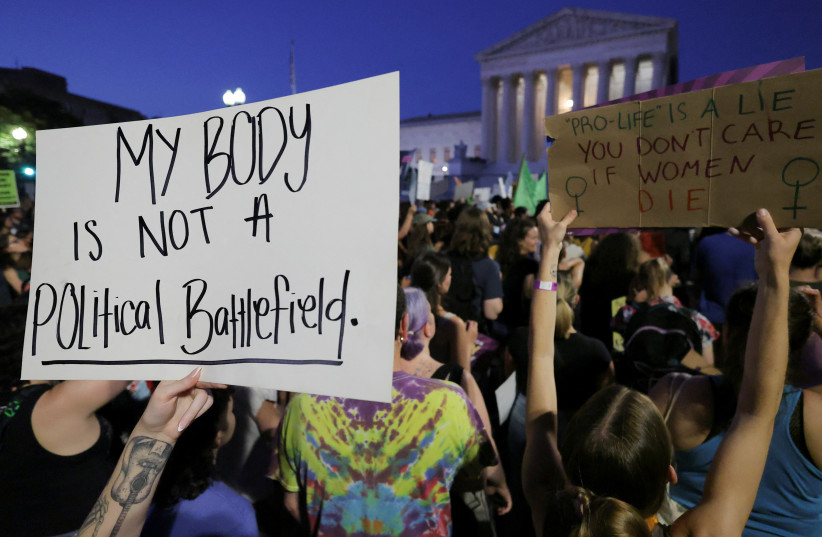With the United States Supreme Court overturning the landmark 1973 Roe V. Wade ruling recognizing a woman's constitutional right to abortion on Friday, the rules and regulations of seeking an abortion will now be determined on a state-by-state basis, drastically changing life for millions of women across the country.
In a 6-3 vote, the court upheld the Republican-backed Mississippi law that banned abortions after the 15th week of pregnancy, and the vote to overturn Roe V. Wade itself was passed with a 5-4 vote.
Republican-appointed Chief Justice John Roberts, who is often seen as a swing vote on the nine-member court, voted to uphold the Mississippi law but voted against the overturning of Roe V. Wade.
While some states already had trigger laws in place which will spring into effect and ban abortion now that Roe V. Wade has been overturned, other states will continue to preserve the right to abortion via laws or constitutional amendments.
Here's where each state stands on the subject of abortion:

States where abortion is already illegal:
Alabama: The state may potentially enforce a ban on abortion that was in place pre-Roe V. Wade which would prohibit all abortions except if the life of the pregnant person would be in danger. Until this has been examined, however, a 2019 law banning all abortions, without exception for incest and rape, is in effect.
Kentucky: Abortions are completely banned in Kentucky unless they are performed in order to save the life of the pregnant person. The law came into effect immediately after the Supreme Court ruling. There are no exceptions for rape or incest.
Louisiana: Abortions are completely banned in Louisiana unless they are performed in order to save the life of the pregnant person. The law came into effect immediately after the Supreme Court ruling. There are no exceptions for rape or incest.
Oklahoma: Abortions are completely banned in Oklahoma from the moment of conception as of a trigger law passed in May. This law does not apply in cases of rape or incest.
Missouri: Missouri became the first US state to activate a trigger law banning abortion on Friday afternoon. The law makes no exception in cases of rape or incest.
South Dakota: Abortions are completely banned in South Dakota unless they are performed in order to save the life of the pregnant person. The law came into effect immediately after the Supreme Court ruling. There are no exceptions for rape or incest.
Texas: A ban on abortions after the sixth week since conception is already in place in Texas. A trigger law banning all abortions, without exceptions for rape and incest, will come into effect 30 days after the Supreme Court decision.
In total, seven states already prohibit abortions under almost all circumstances.

States where abortion will soon be illegal or restricted:
Arizona: A ban on abortions after fifteen weeks since conception, with no exception for rape or incest, will come into effect in September of this year. A pre-Roe V. Wade abortion ban may also be reinstated.
Arkansas: Abortions will be illegal in the state of Arkansas, with no exception for rape or incest, as soon as the state's Attorney-General certifies that the Supreme Court has overturned Roe V. Wade. The only exception to the law will be if the pregnant person's life will be endangered by carrying the pregnancy to term.
Florida: Abortion in Florida is currently legal until viability, but from July 1, it will be illegal to undergo an abortion after 15 weeks since conception, with the exception of if the life of the pregnant person is in danger.
Idaho: The current laws state that abortion is legal until viability (23-24 weeks). However, 30 days after the overturning of Roe V. Wade, all abortions will be considered illegal, with the exception of rape, incest, or if the life of the pregnant person will be endangered.
Mississippi: The current laws state that abortion is legal until 15 weeks. However, 10 days after the state Attorney-General certifies that the Supreme Court has overturned Roe V. Wade, all abortions will be considered illegal.
North Dakota: A trigger law banning all abortions in the state of North Dakota, with exceptions for rape and incest, will come into effect once the state attorney-general certifies that the Supreme Court has overturned Roe V. Wade.
Tennessee: The current laws state that abortion is legal until viability (23-24 weeks). A trigger law banning all abortions, without exceptions for rape and incest, will come into effect 30 days after the Supreme Court decision. However, the state Attorney-General has filed an emergency motion to bring this date forward and ban abortion immediately.
Utah: Abortions will be illegal in the state of Utah, with the exception of rape or incest, as soon as the state's legislative counsel certifies that the Supreme Court has overturned Roe V. Wade. Exceptions will also be made if the life of the pregnant person is in danger or for several fetal abnormalities.
Wyoming: The current laws state that abortion is legal until viability (23-24 weeks). However, five days after the state's Attorney-General has reviewed the Supreme Court decision, abortion will be illegal, with exceptions for rape, incest, or to save the life of the pregnant person.
In total, nine states are set to prohibit abortions under almost all circumstances in the near future.

States where abortion laws are yet to be clearly defined or may change:
Georgia: Abortion is currently legal until 20 weeks after conception, but a state law banning abortions after six weeks is currently pending appeal in the state legislature and could be approved at any time. The six-week ban would have an exception for rape and incest, as well as if the life of the pregnant person is in danger or for several fetal abnormalities.
Indiana: Abortion is currently legal until 22 weeks of pregnancy, but the state governor may call a special session of the state legislature to consider adding new restrictions. A majority of lawmakers signed a letter back in March asking for this to be done should Roe V. Wade be overturned.
Iowa: Abortion is currently legal until 22 weeks of pregnancy, but in June of this year, the state's high court overruled a decision stating that the right to abortion was protected under the State Constitution. Although a law banning abortion after six weeks has been permanently blocked, abortion opponents in Iowa may seek to enforce it in any case.
Kansas: Abortion is legal until 22 weeks after the pregnant person's last menstrual period. Although the state's Supreme Court has recognized the right to abortion, voters in Kansas will vote in August on whether or not to amend the state constitution to change this.
Nebraska: A bill to enact a trigger ban on abortion failed to pass in the state legislature earlier this year. However, the state governor is expected to call a special session to pass a total ban on abortion in the coming weeks.
North Carolina: A pre-Roe V. Wade ban on abortion that limits abortions performed after the 20th week of pregnancy has not yet been reinstated and abortions currently remain legal, but proponents of the law are likely to rally for it to come into effect.
Ohio: Abortion is currently legal until 20 weeks after conception, but a state law banning abortions after six weeks could be approved at any time, a move supported by Republican state governor Mike DeWine. The only exception to the six-week ban would be if the life of the pregnant person is in danger.
South Carolina: Abortion is currently legal until 20 weeks after conception, but a state law banning abortions after six weeks could be approved at any time in the coming weeks or months. The six-week ban would have an exception for rape and incest, as well as if the life of the pregnant person is in danger or for several fetal abnormalities.
West Virginia: The state is likely to try and reintroduce its pre-Roe V. Wade law that banned all abortions with the exception of if the life of the pregnant person was in danger. The law was found to be unconstitutional in 1975 and it is unclear whether or not it can be implemented now without court action amending this ruling.
Wisconsin: A pre-Roe V. Wade law in Wisconsin determined that banned abortion with the exception of if the life of the pregnant person was in danger is thought to now be in effect as it was never revoked. However, the state's Attorney-General has said that he will not enforce the law and has urged local prosecutors to do the same.
In total, 10 states have unclear abortion laws or have laws that may change in the future.

States where abortion remains legal:
Michigan: A pre-Roe V. Wade law that would ban nearly all abortions has been blocked by the state court, and the state's Democratic governor and Attorney General have said that they will not enforce this ban.
Montana: Abortion is legal in Montana until viability. The state Supreme Court has recognized a right to abortion under the state Constitution.
Alaska: Abortion will remain legal throughout the entire length of the pregnancy. The state Supreme Court has recognized a right to abortion under the state Constitution.
Colorado: Abortion will remain legal throughout the entire length of the pregnancy. The state Supreme Court has recognized a right to abortion under the state Constitution.
Illinois: Abortion is legal in Illinois until viability. The state Supreme Court has recognized a right to abortion under the state Constitution.
Maine: Abortion is legal in Maine until viability. The state Supreme Court has recognized a right to abortion under the state Constitution.
Massachusetts: Abortion is legal until 24 weeks of pregnancy, and the state Supreme Court has recognized a right to abortion under the state constitution.
Minnesota: Abortion is legal in Minnesota until viability. The state Supreme Court has recognized a right to abortion under the state Constitution.
Nevada: Abortion is legal until 24 weeks after conception. A state law protecting abortion access was passed in a voter referendum, meaning it cannot be changed without another public referendum.
New Hampshire: Abortion is legal until 24 weeks after the pregnant person's last menstrual period. The state Supreme Court has not recognized a right to abortion under the state constitution.
New Mexico: Abortion is allowed throughout the entire length of the pregnancy, although this policy is not legally protected. The state Supreme Court has not recognized a right to abortion under the state constitution.
Pennsylvania: Abortion is legal until 24 weeks after the pregnant person's last menstrual period. The state Supreme Court has not recognized a right to abortion under the state constitution.
Rhode Island: Abortion is legal in Rhode Island until viability. State law protects abortion access.
Virginia: Abortion is legal until the third trimester of pregnancy. The state Supreme Court has not recognized a right to abortion under the state constitution.
In total, 14 states will allow abortion to remain legal.

States where abortion remains legal with new expansions:
California: Abortion is legal until viability and lawmakers have introduced bills to make it possible for people from out of state to seek an abortion.
Connecticut: Abortion is legal until viability and a new law expands access to providers, shielding both patients and providers from out-of-state lawsuits.
District of Columbia (DC): Although DC is not a state, the district's code protects abortion access and it is legal throughout the entirety of the pregnancy. The city plans to further bolster its protections.
Delaware: Abortion is legal in Delaware until viability. The state Supreme Court has recognized a right to abortion under the state Constitution. A new law will expand access to providers.
Hawaii: Abortion is legal in Hawaii until viability. The state Supreme Court has recognized a right to abortion under the state Constitution. A new law will expand access to providers.
Maryland: Abortion is legal until viability and is protected by state law. New laws increase access to providers and insurance coverage.
New Jersey: Abortion is legal throughout the length of the pregnancy, and the governor has proposed that it be made possible for people from out of state to seek an abortion.
New York: Abortion is legal until viability, as protected by state law. Legislators may propose additional protections such as an amendment to the State Constitution.
Oregon: Abortion is legal throughout the length of the pregnancy and is protected by state law. The state legislature has approved $15 million to support those seeking the procedure.
Vermont: Abortion is legal throughout the length of the pregnancy, and in November a referendum will be held on whether or not the State Constitution should include abortion protection.
Washington: Abortion is legal until viability and state law protects abortion access. A new law also expands access to providers.
In total, 10 states and DC will allow abortion to remain legal and expand their abortion laws.
